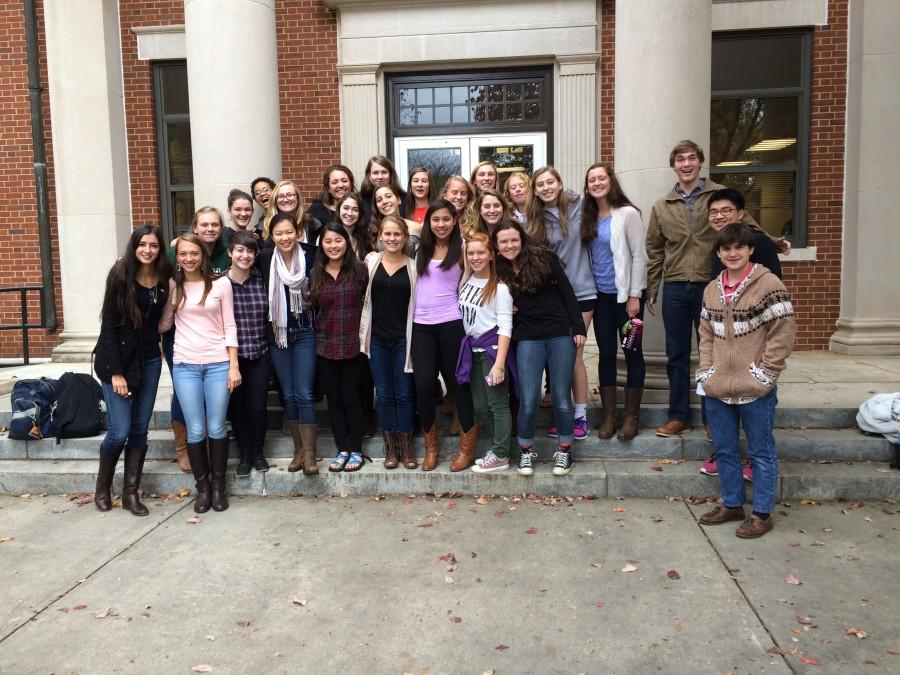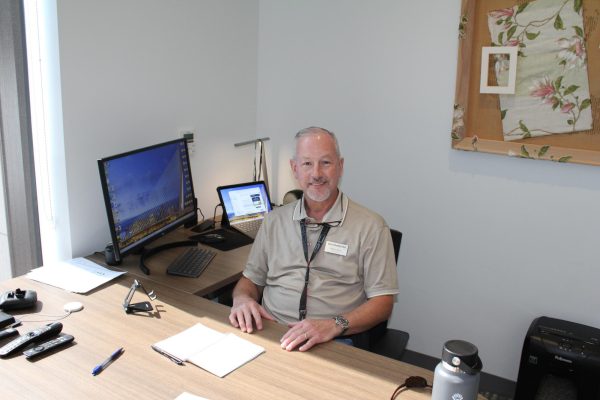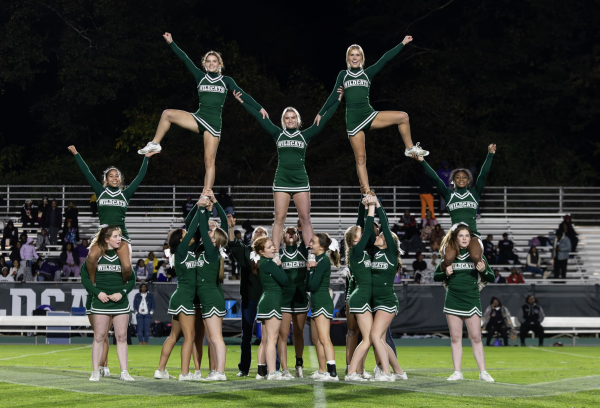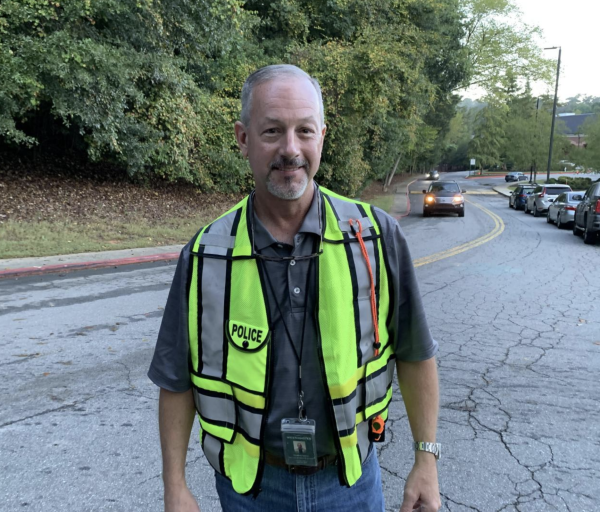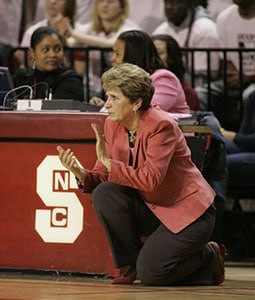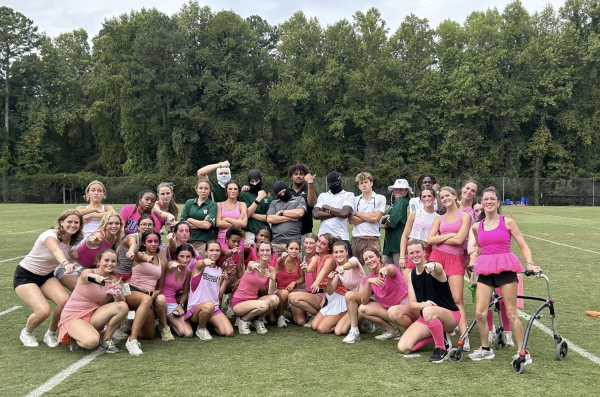G.E.A.R. explores complexities of gender, feminism
A noticeable lack of spectators at a female team’s athletic competition compared to the men’s game immediately after. A teacher’s harsh warning to a girl wearing a skirt more than two inches above her knee.
Are these incidents innocuous or part of systemic sexism, the discrimination against someone on the basis of gender?
“I really don’t think sexism is prominent here because it’s Westminster and it’s such a high-level school,” said junior Ethan Roback. “People aren’t being oppressed here just because they’re women.”
Such a view is naive, argues junior Sara Sklenka.
“Sexism is most definitely a problem both here at Westminster and outside our community,” said Sklenka. “Sexism can be anything ranging from an ‘oh she lifts’ comment to blatant prejudice of a gender. One of the most appalling things I have seen in a while was that quote from the last Bi-Line issue where someone said that they think women do not belong in the Senate.”
The Gender Equality and Relations (G.E.A.R.) group works to explore opinions such as these and to help shed light on issues regarding gender in the community. In 2012, this group emerged initially as the Global Women’s Club, headed by current juniors Jayme Selby and Haley Vincent and advised by former Dean of Women Frances Fondren, with a focus on fighting against sex-trafficking.
“GEAR got started at the end of freshman year, but it didn’t get off the ground until the next year,” said Selby. “I wanted to continue the work I had done over the summer with a nonprofit, YouthSpark, that deals with child sex trafficking, and Haley wanted to continue her work from a mission trip she did in India over the summer with an organization that also works with trafficking victims.”
Over time, G.E.A.R.’s mission transitioned from simply combatting the sex-trafficking epidemic to exploring gender relations. With the added leadership of juniors Dana Harvey and Vivienne Reed as well as the sponsorship of new English teacher Reanna Ursin whose academic background in critical race studies dovetails with club’s mission, G.E.A.R. has evolved to become a forum for discussion of gender issues and feminism.
“GEAR is positive for a number of reasons,” said Ursin. “One of which is because education and understanding are so important. Second, it makes gender and feminism not just something that is a concern of the administration or teachers. I think it’s great that students are taking an active role in shaping the conversation. I think [gender] is an important lens through which to analyze the world.”
Along with this shift in mindset came a shift in the club’s name. In lieu of the Global Women’s club, the club became known as G.E.A.R. to make it clear that both genders were welcome.
“We changed the name because we wanted to create an environment that was more inclusive,” said Selby, “in order to bring more of our male peers into the fight against sexism and to clarify that we’re not an affinity group.”
This simple name change illustrates the larger controversy surrounding the group in that many feel that G.E.A.R. is not an effective catalyst for gender equality.
“To me, and probably to a lot of people, feminism seems more geared towards women’s rights,” said junior Kush Bansal. “I know it means equality for all but that’s just how I think it comes across.”
However, the club’s leadership argue that this emphasis is necessary because women have historically been disenfranchised.
“In the past, women have basically started from nothing since they had no rights,” said Vincent. “So, because we’re coming from such a low place, there has to be a bigger focus on women. We’re not trying to put women on top; we’re just trying to balance everything out and make an even playing field.”
This idea of evening out the playing field supports the underlying message behind feminism, which the Oxford English Dictionary defines as: “The advocacy of women’s rights on the grounds of political, social, and economic equality to men.” Nevertheless, the concept of feminism has been misconstrued and misrepresented.
“Feminism has currently become a dirty word for a number of historical reasons,” said Dean of Women Tiffany Boozer, “but the reality is, if you believe that women are equal to men and should be treated equally- not that they are the same as men, but that they are worthy of equal treatment- then you’re a feminist. I think more education in our school about that would be great.”
This misunderstanding of feminism has led to damaging stereotypes that harm the ultimate mission of equality for all sexes.
“Everyone thinks feminists are crazy, bra-burning lesbians and that any guy who calls himself a feminist is just trying to suck up to girls,” said Reed. “This misunderstanding of what feminism is really turns people away from the important message we’re trying to spread.”
Though G.E.A.R. aims to elucidate the real meaning behind feminism, some argue that G.E.A.R.’s environment is counter-productive to this goal.
“A major problem that this club has is that whenever someone says something that isn’t 100% feminist, there are members who will attack that person until they are forced into silence,” said junior Sarah Lock. “I think this is a huge issue because in these cases, they are giving a bad name to feminists and what we stand for. I think that’s why so many men are hesitant to call themselves feminists because they view it as man-hating and un-accepting.”
The members of G.E.A.R. believe that this misunderstanding of feminism’s core principles is harmful to the club’s goal of fighting against the realities of sexism in everyday life.
“The club serves to educate both men and women that gender inequality is a prevalent issue and that it can be fixed,” said Sklenka. “In order for the second part to happen, the first needs to be acknowledged. There are men at Westminster that do not understand that there is a sexism problem at Westminster and thus have no clue how or why they should want to fix this problem.”
Although seen in many aspects of school life, members view that sexism is especially evident in attitudes toward athletics.
“The one place I see sexism the most at school is in sports,” said Vincent. “As an athlete, it’s really discouraging to put in all that work just to have no one show up to your games. Like for basketball, almost no one shows up for the girl’s game, but they come in the last two minutes because the boy’s game is about to start; instances like that are really disheartening to see.”
Some also ascertain that the dress code is enforced against girls in an unequal manner in comparison to boys.
“I think the dress code is sexist,” said senior Caroline Harris. “It’s not ok for guys to hear us girls being told ‘you can’t wear that it’s distracting.’ That’s essentially saying ‘hey you should disrespectfully stare at a girl who is out of dress code because it’s in your DNA and you can’t help but objectify women.’ They should hear ‘girls can’t wear that because it isn’t appropriate for a scholarly and professional environment.’”
In face of this gender discrimination, G.E.A.R. hopes to provide an open environment for discussion of such issues.
“I think the meetings are beneficial because when we talk about things like sexism at Westminster because it acts as a time when all the girls can come together and can talk about what they’ve encountered,” said Vincent. “That’s really helpful, especially to know how to approach sexism and situations of that nature.”
Yet, as G.E.A.R. attempts to address such problems, the recent increase in male membership has changed many people’s approach to debate and discussion of controversial issues.
“With more male members in the club this year, I feel a little less comfortable being completely honest because I’m a lot more conscious that what I could say could deter others from joining the club, which is absolutely not what I want to do, but I also feel more aware,” said junior Eliza Namnoum. “It’s really, really easy for me to stray from rationality and become more passionate and heated, and I feel like I have a better grip on that now.”
Even with the recent expansion of membership to include boys, the club still lacks underclassmen, possibly from a lack of publicity.
“I haven’t even heard of the club, but I’d be open to going to a meeting,” said freshman Elizabeth Brougher. “My grade in general is pretty uninformed about feminism because the topic hasn’t been discussed at all. I feel like everyone should be informed about it, especially in this decade where everyone is starting to become more male-centered.”
With its bi-monthly meetings, the club emphasizes the importance of conversation around all topics, especially those considered taboo, surrounding gender relations. To further spread information and to foster discussion, G.E.A.R. utilizes Facebook as an online forum. However, the impersonality behind social media has caused a number of fights pitting genders against each other to erupt in the online group, but has not translated into real life dialogue.
“If someone feels strongly about a certain issue I think they should go to the actual G.E.A.R. club meeting instead of posting in the Facebook group,” said junior Billy McGahan. “I would like to see the kind of discussions that occur on social media happen in the club meetings, because the discussion would carry much more value if people were physically representing their opinions.”
In the same respect, some members view this discrepancy between online presence and real-life presence as representative of a larger issue: lack of action and application to the real world.
“I would like to see actual service projects like something similar to what Haley has done by helping the girls who were sexually abused,” said junior Sydney Vortice. “I just feel like there should be something more hands-on than having monthly 45-minute discussions featuring bagels in central air conditioning.”
Similarly, Lock shares this perspective.
“I wish GEAR tried to actively change the ‘status quo’ instead of just talking,” she said. “We need to walk the walk as well as talk the talk. Right now, I feel like GEAR is just a group of students who get together to complain about the problems that women face in today’s society. In order to actually make a change, we need to get involved outside of our little community.”
In contrast, the leaders and other members advocate for discussion in and of itself because they see it as a powerful tool to help address difficult gender issues.
“I think that there’s a lot of change that comes from just talking about things,” said Selby. “Also, we’ve done a lot of things outside of school. We went to the Georgia Women’s Assembly last year. We’re also working on a lot of things to get our voice out there; we’re creating a women’s magazine that we hope to publish sometime early next year. In that way, just getting the word out about feminism can create a lot of change.”
Namnoum argues that this change in the upper school community’s attitude toward feminism has already become apparent.
“From personal experience, I can say that it’s certainly less of a taboo [than before the club’s inception] to discuss feminism or women’s rights with people who aren’t members of the club,” said Namnoum. “I felt pretty restrained there in the past, but this year, I’ve actually been invited into conversation by people who are curious about women’s rights issues or want to know more about the club.”
As G.E.A.R. moves forward and continues to concentrate on gender relations, it aims to not only open up its doors to more people but also to open up people’s minds so that everyone can gain a better understanding of such tough problems as sexism. To help spread awareness about gender issues, G.E.A.R. and its members emphasize the method that has been most impactful in the past and that will continue to hold such weight in the future: conversation.
“Even if someone believes sexism is not a problem, that doesn’t eliminate the need for G.E.A.R.,” said junior Allison Wise. “Discussion of tensions and differences between different races, classes, or genders is always a powerful tool, regardless of anyone’s standing.”

